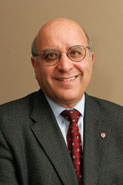Tony Masi: Facilitate or get out of the way
Tony Masi: Facilitate or get out of the way McGill University
User Tools (skip):
Tony Masi: Facilitate or get out of the way
Tony Masi does not mince his words. When the newly appointed provost is asked how he views the role of administrators at McGill, he doesn't hesitate. "Facilitate or get out of the way."

Tony Masi wants to build on core disciplines
Owen Egan
"We have to make sure that we don't create constituencies in McGill where academics and non-academics are pitted against each other," he continued. "Everyone in an administrative position must understand that their fundamental role is to help the university achieve its goals."
It is only natural that, as provost, Masi places academic priorities at the very top of the university's goals. "We need to provide the best possible education for undergrads and grad students, and world-class training for post-doctoral fellows. We also have to ensure that our professional programs - not just our basic undergraduate programs - serve the student population well. Finally, we need to continue to attract the world's best professors."
And while he believes that McGill must continue to build upon the core disciplines within faculties ("the very foundation upon which this great university has been built"), Masi also thinks that some of the most exciting and interesting areas for development lie somewhere between faculties. "Interdisciplinary, multidisciplinary, trans-disciplinary - pick the word you want," he said. "Part of our vision is to improve partnerships across faculties; proceed with more interdisciplinary hires and have the Master Plan Task Force redesign the campus to accommodate cross-faculty research."
Masi points to these academic priorities as "drivers" for the annual allocation of budgets for the upcoming capital campaign and future endowments.
The issue of funding is inextricably linked to McGill's hallmarks of academic and institutional excellence and one that Masi admits is the school's weakness. "Unless we diversify our revenue-generating base, we will be facing some serious challenges in terms of our ability to compete."
While it has always been in vogue to blame the provincial and federal governments for a lack of funding, Masi thinks it is entirely unrealistic to expect them to sustain all the needs of a world-class university. Instead, he believes that the university will have to rely increasingly upon endowments, be they individuals or foundations, for support.
Masi is unflinching when it comes to the eternally sticky issue of tuition hikes. "Undergraduates must understand that the cost of education cannot be borne by the current low tuition fees. We need to increase the revenue generated by the people who most directly benefit from this great education - the students themselves."
That being said, Masi hopes to continue to pressure governments at all levels to increase financial support for graduate students. "Someone doing PhD research is making a direct contribution to society. In turn, I think that society should bear some of the financial responsibility for that."
In the end, Masi seems to possess the perfect blend of optimism and realism for the job. "After 26 years at McGill, I am very excited to be able to serve the university in another capacity - one that I feel most comfortable with," he says. "McGill is a wonderful place and I think we have a strong likelihood of achieving all our objectives - so long as we stick to the plan. I just hope to do my part and help facilitate the incredible work that is done here."

